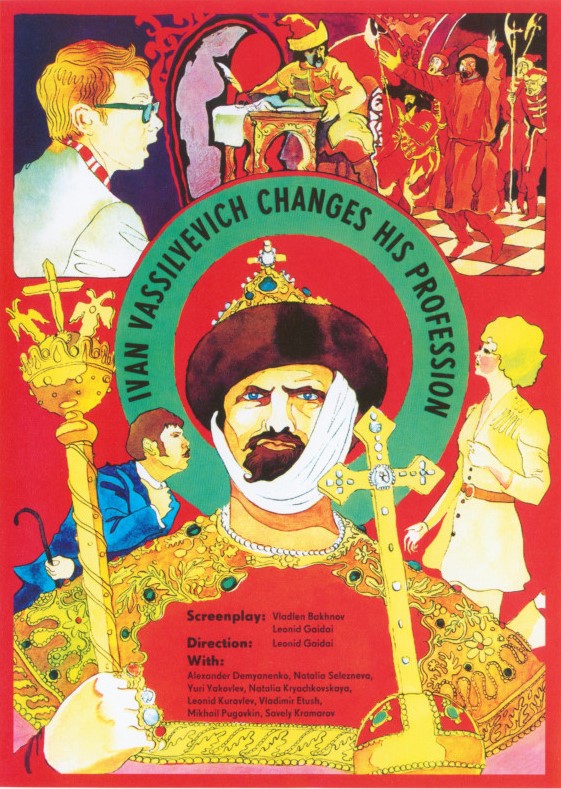 This is, quite simply, the Soviet time travel comedy. An adaptation of a posthumously published Mikhail Bulgakov play, 1973’s IVAN VASILIEVICH CHANGES HIS PROFESSION (Ivan Vasilevich menyaet professiyu) was helmed by Leonid Gaiday, Russia’s top comedy director. As is often the case, the film was an enormous success in its native land but is quite obscure in the western world (where it’s known as IVAN VASILIEVICH: BACK TO THE FUTURE).
This is, quite simply, the Soviet time travel comedy. An adaptation of a posthumously published Mikhail Bulgakov play, 1973’s IVAN VASILIEVICH CHANGES HIS PROFESSION (Ivan Vasilevich menyaet professiyu) was helmed by Leonid Gaiday, Russia’s top comedy director. As is often the case, the film was an enormous success in its native land but is quite obscure in the western world (where it’s known as IVAN VASILIEVICH: BACK TO THE FUTURE).
It stars Aleksandr Demyanenko (1937-1999) in his signature role of Shurik, a nerdy young scientist who previously headlined the Leonid Gaiday directed comedies OPERATION “Y” AND SHURIK’S OTHER ADVENTURES (Operatsiya ‘Y’ i drugie priklyucheniya Shurika; 1965) and KIDNAPPING, CAUCASIAN STYLE (Kavkazskaya plennitsa, ili Novye priklyucheniya Shurika; 1967), and appeared in the 1990s films OLD SONGS OF THE MAIN THINGS 2 (Starye pesni o glavnom 2; 1997) and OLD SONGS OF THE MAIN THINGS 3 (Starye pesni o glavnom 3; 1998). The Shurik character obviously means little to us, but was apparently quite a draw to Soviet viewers.
The film begins, like THE WIZARD OF OZ, in black and white. It has Shurik blowing a fuse in his Moscow apartment building while attempting to power a time machine. He ends up being knocked cold, and (again like THE WIZARD OF OZ) comes to in a full color universe, where his actress wife (Natalya Seleznyova) is leaving him and his building superintendent Bunsha (Yury Yakovlev) is harassing him. Also afoot is George Miloslavsky (Leonid Kuravlyov), a burglar who gets thrust back in time, together with Bunsha, to the era of Ivan Vasilievich, a.k.a. Ivan the Terrible (Yury Yakovlev, again).
Bunsha, who closely resembles the Terrible one, disguises himself as that figure, covering up the fact that he lacks the famous pointed beard with a rag tied around his head (claiming it’s due to a toothache). The real Ivan the Terrible, meanwhile, is thrust forward in time and ends up in Shurik’s apartment. Thus Bunsha and George bungle their way through 14 Century Russia while Vasilievich attempts to subside in early 1970s Moscow, a situation complicated by the fact that the time machine has malfunctioned and police are after Shurik.
It’s all about tone. Leonid Gaiday was apparently quite concerned that audiences were absolutely sure about the nature of the film they were watching, and packs the film with cartoon-worthy beep-bop music and fast motion set-pieces. The incredibly broad, caricatured performances match the style, with heavily improvised dialogue and an irreverent 1970s attitude that diverge mightily from the Mikhail Bulgakov text. Yet the film must nonetheless be counted as one of the more successful Bulgakov adaptations, as in direct contrast to most of the others (such as HEART OF A DOG and the miniseries version of THE MASTER AND MARGARITA), which tend to emphasize political commentary, its major focus is comedy.
More damaging to Western sensibilities is the film’s relentlessly Russian-centric thrust. It’s filled with cultural references and in-jokes that can only be deciphered by in-the-know viewers and Bulgakov scholars (plus the it’s-all-a-dream-but-not ending is downright aggravating).
What resonated with this Western viewer was the manic invention of the narrative and the irrepressible energy of the filmmaking. The proceedings are fast, frantic and very eager to please—and if you’re willing to give yourself over to it, pleasing is precisely what IVAN VASILIEVICH CHANGES HIS PROFESSION is.
Vital Statistics
IVAN VASILIEVICH CHANGES HIS PROFESSION (Ivan Vasilevich menyaet professiyu)
Mosfilm
Director: Leonid Gaiday
Screenplay: Vladlen Bakhnov, Leonid Gaiday
Cinematography: Sergey Poluyanov, Vitaly Abramov
Editing: Klavdiya Aleyeva
Cast: Aleksandr Demyanenko , Yury Yakovlev, Leonid Kuravlyov, Saveliy Kramarov, Natalya Seleznyova, Natalya Belogortseva-Krachkovskaya, Natalya Kustinskaya, Vladimir Etush, Mikhail Pugovkin, Sergey Filippov, Eduard Bredun, Aleksandr Vigdorov, Valentin Grachyov, Natalya Gurzo, Ivan Zhevago
